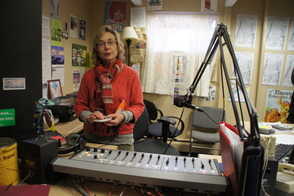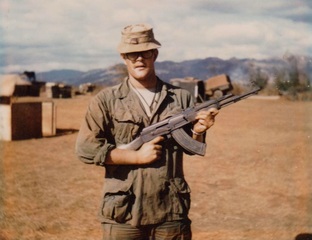 Maree McHugh in the KRFP studio Maree McHugh in the KRFP studio Maree McHugh is a good-hearted Idaho nurse who loves being a weekend deejay. One of her heroes is Adrian Cronauer, the inspiration for Robin Williams' character in the 1987 war comedy "Good Morning, Vietnam." It stands to reason she would like "Boocoo Dinky Dow: My short, crazy Vietnam War," which is punctuated by Grady's humor. She said it's the only book she's been able to bring herself to read about the war. I've also heard that from some veterans. Maree interviewed me about the book on January 20, 2013. She really did her homework, and started the live interview with a quick recap of the war. She asked me to read several passages and to give some personal perspective on Grady, to whom I was married in the 1980s. And -- this was totally cool -- she interspersed our conversation with songs from the soundtrack of "Good Morning, Vietnam." The hour-plus interview is archived on the website of KRFP, Radio Free Moscow. You can listen to it here. Or you can listen to an eight-minute excerpt and see some of Grady's art in this Youtube video. Maree isn't a veteran. In fact, she protested America's involvement in Vietnam. But she is eager to thank veterans for bearing the burden of our wars. Many thanks to her for helping me share Grady's stories. On the air, Maree read this Richard Nixon quote, which I'm doing my small part to prove wrong: "No event in American history is more misunderstood than the Vietnam War. It was misreported then, and it is misremembered now."
32 Comments
 Grady Myers in Vietnam What war story would be complete without expletives and acronyms? In the latter category, the word DEROS is key to understanding the entire Vietnam War. In his memoir "Boocoo Dinky Dow," Grady explains its meaning and importance soon after his boots hit the red dirt of Southeast Asia: On the way to our own barracks, we encountered soldiers with their own theme song: “Short, We’re Short!” They were short-timers, their Date of Estimated Return from Overseas close at hand. Or, at least, they wanted us replacements—who faced a year in Vietnam before our DEROS—to feel bad. When a soldier stepped onto Vietnamese soil, he was shorter than the man getting off the plane behind him. Men counted their 365 days. I've wondered why the Army limited soldiers to a year "in country," when that's not how it worked in wars before or after. This is on my mind because I just came across The Vietnamization of Public Education. in which Washington Post blogger Steve Cohen cites Tom Rick's new book, "The Generals." Cohen writes: Those in command positions generally served for six months in a staff position and six months in the field. When individual stints were up, officers and soldiers left the field and substitutes arrived. Back in the field, no community was built. No sense of allegiance to each other emerged that was as strong as that which had helped soldiers and officers survive so many other conflicts. ... As one historian noted, it meant that rather than having an Army in Vietnam for eight years (1965-1973), we had an army in Vietnam for one year eight times. My curiosity about this led me to Mark DePu's Vietnam War: The Individual Rotation Policy. Here's a snippet: When defending the policy, the Army's senior leaders invariably cited their desire to create an equitable system of treatment for all soldiers. That was the sentiment expressed by both Generals Westmoreland and Johnson. 'The one-year tour was adopted primarily so that the hazards of combat might be shared by more that just a limited number of people,' explained Johnson during an interview in 1973. Westmoreland asserted that it "spread the burden of a long war over a broader spectrum of both Army Regulars and American draftees…I hoped it would extend the nation's staying power by forestalling public pressure to 'bring the boys home." But, as the thought-provoking article explains, that logic only went so far in explaining what became, in the 1960s and '70s, a national fact of life (and death). |
Julie Titone is co-author of the Grady Myers memoir "Boocoo Dinky Dow: My short, crazy Vietnam War." Grady was an M-60 machine gunner in The U.S. Army's Company C’s 2nd Platoon, 1st Battalion, 8th Regiment, 4th Infantry Division in late 1968 and early 1969. His Charlie Company comrades knew him as Hoss. Thoughts, comments? Send Julie an email. Archives
November 2018
|
 RSS Feed
RSS Feed